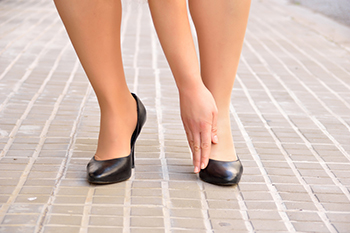
High heels are undoubtedly stylish and add an elegant touch to any outfit, but there is no denying that walking in them can be a daunting task for many. Several things make it difficult to walk gracefully and comfortably in high heels. First, the angle of the foot in high heels forces the wearer to put most of their body weight on the balls of the feet. This shift in weight distribution can lead to instability, causing a precarious and unsteady gait. Second, the elevation of the heel shortens the Achilles tendon and calf muscles, making it challenging to take regular, longer strides. This altered biomechanics can cause discomfort and make walking feel unnatural. Additionally, the pressure and friction created by the narrow, pointed shape of high heels can lead to blisters, calluses, and foot pain. In essence, the difficulty of walking in high heels is not merely a matter of fashion; it is a matter of biomechanics and comfort. For many, it is a skill that requires practice and endurance. So, while high heels can make a powerful fashion statement, they also pose a challenge for those who dare to wear them. If you would like more information on how high heels can affect the feet and better alternatives to consider, it is suggested that you speak with a podiatrist.
High heels have a history of causing foot and ankle problems. If you have any concerns about your feet or ankles, contact Donald Manger, DPM from Associated Podiatric Physicians, PA. Our doctor can provide the care you need to keep you pain-free and on your feet.
Effects of High Heels on the Feet
High heels are popular shoes among women because of their many styles and societal appeal. Despite this, high heels can still cause many health problems if worn too frequently.
Which Parts of My Body Will Be Affected by High Heels?
- Ankle Joints
- Achilles Tendon – May shorten and stiffen with prolonged wear
- Balls of the Feet
- Knees – Heels cause the knees to bend constantly, creating stress on them
- Back – They decrease the spine’s ability to absorb shock, which may lead to back pain. The vertebrae of the lower back may compress.
What Kinds of Foot Problems Can Develop from Wearing High Heels?
- Corns
- Calluses
- Hammertoe
- Bunions
- Morton’s Neuroma
- Plantar Fasciitis
How Can I Still Wear High Heels and Maintain Foot Health?
If you want to wear high heeled shoes, make sure that you are not wearing them every day, as this will help prevent long term physical problems. Try wearing thicker heels as opposed to stilettos to distribute weight more evenly across the feet. Always make sure you are wearing the proper shoes for the right occasion, such as sneakers for exercising. If you walk to work, try carrying your heels with you and changing into them once you arrive at work. Adding inserts to your heels can help cushion your feet and absorb shock. Full foot inserts or metatarsal pads are available.
If you have any questions please feel free to contact our office located in Hamilton Township, NJ . We offer the newest diagnostic and treatment technologies for all your foot and ankle needs.
